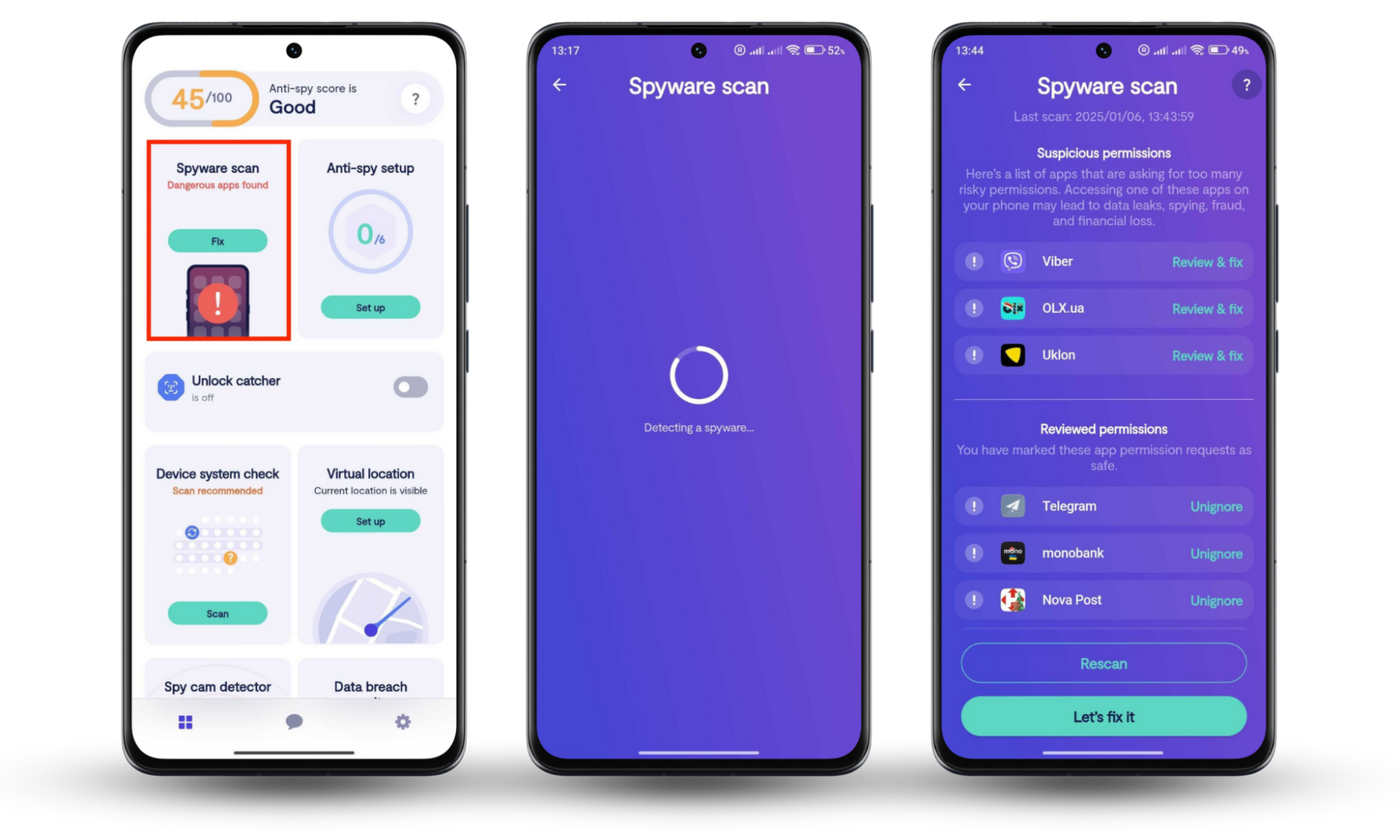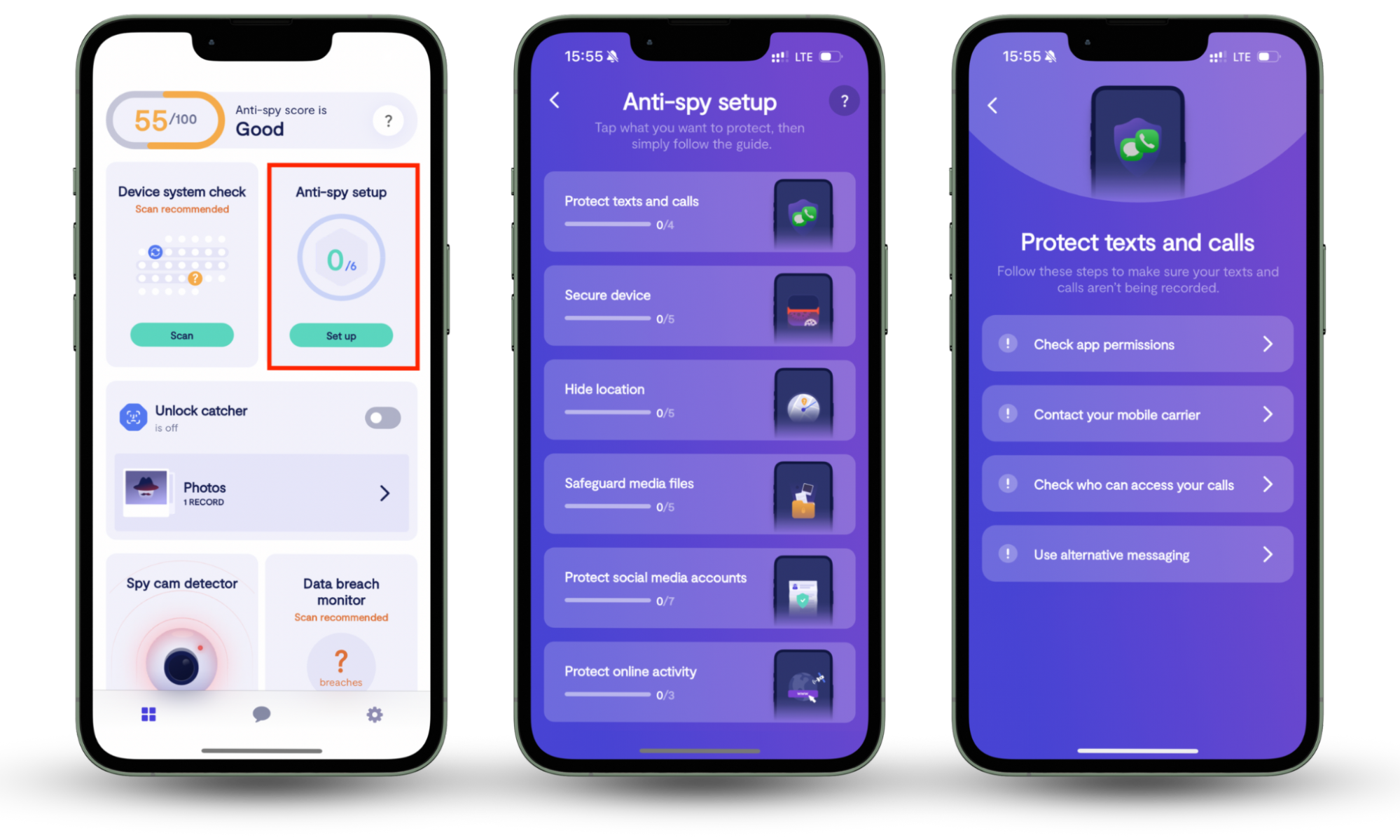Table of contents
- Understanding cyberstalking
- Are there federal laws against cyberstalking
- How cyberstalking laws vary by state
- 1. States with strictest cyberstalking laws
- 2. States with more lenient penalties
- 3. States without clear laws on cyberstalking
- Conclusion
Understanding cyberstalking
Cyberstalking is a serious form of digital harassment that goes beyond one-time messages or arguments. It involves repeated, unwanted contact through texts, emails, social media, or tracking tools—the goal is to intimidate, threaten, or control you.
Cyberstalkers may monitor your online activity, steal your personal data, or spread false claims. To take legal action, you must show the behavior caused serious distress or made you fear for your safety or that of a loved one.
Also, read ‘What is stalking’?
State laws vary. Some define cyberstalking clearly, while others leave grey areas—especially when no direct threat exists. Depending on where you live, cyberstalking may include:
- Repeated contact after being told to stop
- Tracking someone with spyware or GPS without consent
- Posting private information or photos online
- Creating fake profiles to harass or impersonate
- Encouraging others to target the victim
States also impose different penalties, but cyberstalking can lead to steep fines and lengthy prison time. Learn how to prevent cyberstalking to stay safe.
If you see signs that someone is stalking you online, protect yourself with Clario Anti Spy. On Android, run the Spyware scan to uncover apps that secretly track your activity.
- Open Clario Anti Spy and create an account.
- Press Fix beneath Spyware scan.
- Wait for the scan to complete, then press Let’s fix it to resolve any suspicious issues.

On iOS, use the Anti-spy setup to block unauthorized access and stay safe, preventing stalkers from installing spy software.
- Open Clario Anti Spy and press Set up underneath Anti-spy setup.
- Follow the instructions on the Anti-spy setup page to secure your device and make it harder for cyberstalkers to track you.

Are there federal laws against cyberstalking
Yes, federal cyberstalking laws exist in the U.S., although states handle most cases. Here are the federal laws that apply to cyberstalking:
- 18 U.S. Code §2261A—Stalking: This law makes it a federal crime to use electronic communication systems or devices to stalk someone across state lines. It applies when the conduct places someone in reasonable fear of death, serious injury, or emotional distress.
- Violence Against Women Act (VAWA): VAWA includes cyberstalking, especially in domestic violence cases. It allows federal prosecutors to charge offenders when cyberstalking involves intimate partners.
- Interstate Communications Act (18 U.S. Code §875): This law criminalizes sending threats across state lines using emails, text messages, or other online platforms. It doesn’t require physical contact—sending a threat alone can report federal charges.
- Computer Fraud and Abuse Act (CFAA)—18 U.S. Code §1030: Congress originally passed this law to combat hacking. If a cyberstalker installs spyware, hacks social media, or retrieves personal data without permission, prosecutors can apply the CFAA.
- Harassment via Telecommunications—47 U.S. Code §223: This statute criminalizes using phones or the internet to make threatening communications. If stalkers repeatedly make abusive contact, prosecutors can charge them under this law.
While these laws give the federal government tools to prosecute cyberstalking, state authorities still handle most cases. If your ex is tracking you across state boundaries, learn how to deal with a stalker ex.
How cyberstalking laws vary by state
U.S. states handle cyberstalking laws in different ways. While all 50 states have laws against stalking or harassment, not all clearly define or criminalize cyberstalking.
Some states treat it as a felony, while others charge it as a misdemeanor or include it under general harassment. These differences affect how authorities protect victims and prosecute offenders.
1. States with strictest cyberstalking laws
Some states have strict cyberstalking laws with clear definitions, felony charges, and tough penalties. These laws often cover doxxing (sharing private information), impersonation, and repeated online threats.
Here are the states with the strictest cyberstalking laws:
- California. Penal Code §646.9 treats cyberstalking with credible threats causing fear as a felony, punishable by up to 5 years in prison.
- Florida. Statute §784.048 classifies cyberstalking as a first-degree misdemeanor. If it involves threats or minors under 16, it becomes aggravated stalking—a third-degree felony with up to 5 years in prison.
- Illinois. Uses harassment statutes (720 ILCS 5/12-7.5) to address cyberstalking. Penalties range from Class 4 to Class 3 felonies, with 1–5 years in prison.
- Maryland. Prosecuted under harassment law (§3-803). First offenses are misdemeanors with up to 90 days in jail and $500 in fines. Repeat offenses carry up to 180 days and $1,000.
- Michigan. Criminalizes cyberstalking under MCL §750.411s and §750.411x. First offenses carry up to 2 years in prison or a $5,000 fine. Aggravated cases—like involving minors, threats, or protection order violations—carry up to 5 years and $10,000.
- New Jersey. Enforces strong cyber harassment and stalking statutes. Penalties range from 18 months and a $10,000 fine (fourth-degree) to 10 years and $150,000 (second-degree).
- New York. Prosecutes cyberstalking under Aggravated Harassment (§240.30) and Stalking (§120.45–120.60). Penalties range from misdemeanors to felonies, depending on severity.
- North Carolina. Supports cyberstalking under §14-196.3. Penalties vary by prior convictions and can include fines and jail time.
- Texas. Addresses cyberstalking under Online Harassment (Texas Penal Code §33.07) and Stalking (§42.072), classifying it as a felony. First-time offenses can result in up to 10 years in prison, with repeat offenses leading to up to 20 years.
- Virginia. Using a computer to coerce, intimidate, or harass someone is a Class 1 misdemeanor under §18.2-152.7:1. Penalties include up to 12 months in jail and fines up to $2,500.
- Washington. Cyberstalking is a gross misdemeanor under RCW §9.61.260, punishable by up to one year in jail and fines up to $5,000.
These states also use broader legal definitions of cyberstalking, making it easier for police to take action and for victims to get help quickly.
2. States with more lenient penalties
These states have laws that can apply to cyberstalking and cyberbullying, but they lack dedicated or detailed statutes. Instead, prosecutors rely on general stalking or harassment laws, which often carry lighter penalties—like misdemeanors for first-time offenses.
For example:
- Alabama. Applies harassment and stalking laws to cyberstalking. First-degree stalking is a Class C felony with 1–10 years in prison. Second-degree stalking is a Class B misdemeanor with up to 6 months in jail and a $3,000 fine.
- Alaska. Prosecutes cyberstalking under Alaska's harassment statutes (§11.61.120), which include communications that threaten physical injury or sexual contact. Violations are Class B misdemeanors, punishable by up to 90 days in jail and a $2,000 fine.
- Arizona. Adds electronic communications into harassment law (§13-2921). Class 1 misdemeanors carry up to 6 months in jail and a $2,500 fine.
- Colorado. Finds cyberstalking as a felony under stalking law (§18-3-602). Class 5 felonies carry 1–4 years. Prior convictions or restraining order violations raise it to Class 4, with 2–8 years.
- Connecticut. Defines electronic stalking as a Class B misdemeanor under CGS § 53a-181f. Involves GPS or similar tracking used to cause fear for personal safety. Penalties include up to 6 months in jail.
- Delaware. Applies stalking law (§1311) to electronic harassment. Class C felonies carry up to 15 years in prison.
- Hawaii. Includes electronic communication under stalking law (§711-1106.5). Misdemeanors carry up to 1 year in jail and $2,000 in fines.
- Indiana. Uses general harassment (§35-45-2-2) or stalking (§35-45-10-5) laws. Harassment is a misdemeanor; stalking is a Level 6 felony with up to 2.5 years in prison.
- Iowa. Covers cyberstalking under §708.11. Aggravated misdemeanors carry up to 2 years in prison. Class C felonies apply in more serious cases.
- Kansas. Applies general stalking law (§21-5427). First offenses are Class A misdemeanors with up to 1 year in jail. Repeat or aggravated cases are felonies with longer sentences.
- Kentucky. Kentucky's harassment laws (§525.080) cover electronic communications intended to intimidate or harass another person. Penalties can include fines and jail time, depending on the offense's severity.
- Louisiana. Uses §14:40.2 to criminalize electronic stalking. First offenses are misdemeanors with up to 1 year in jail and $1,000 in fines. Aggravated cases are felonies with higher penalties.
- Maine. Prohibits cyberstalking under §210-A. First offenses are Class D crimes with up to 1 year in jail and $2,000 in fines. Repeat offenses rise to Class C felonies with up to 5 years and $5,000.
- Massachusetts. Applies stalking law (Chapter 265, §43) to electronic communications. First offenses carry up to 5 years in state prison or 2.5 years in jail, plus fines up to $1,000. Repeat offenses or restraining order violations increase penalties.
- Minnesota. Covers cyberstalking under §609.749. Penalties range from misdemeanors with 90 days to felonies with up to 10 years in prison and $20,000 in fines, depending on severity.
- Mississippi. Mississippi's cyberstalking laws (§97-45-15) classify offenses as misdemeanors, punishable by up to one year in jail and fines up to $500 for first offenses.
- Missouri. Treats cyberstalking as a misdemeanor unless it involves threats or prior convictions. Stalking (§565.225) and harassment (§565.090) laws apply. Class E felonies carry up to 4 years in prison.
- Montana. Handles most cyberstalking as civil unless threats are present. Stalking (§45-5-220) includes electronic contact, but criminal charges are rare without repeated or threatening behavior.
- Nebraska. Defines stalking under §28-311.03 to include electronic contact. First offenses are Class I misdemeanors with up to 1 year in jail and $1,000 in fines. Repeat offenses are Class IV felonies with up to 2 years and $10,000.
- New Hampshire. Applies §633:3-a to cyberstalking. First offenses carry up to 1 year in jail and $2,000 in fines. Repeat offenses or restraining order violations lead to harsher penalties.
- Ohio. Applies §2903.211 ("Menacing by Stalking") to electronic communication. First offenses are first-degree misdemeanors with up to 180 days in jail and a $1,000 fine. Repeat offenses are fifth-degree felonies with 6–12 months in prison and fines up to $2,500.
- Oklahoma. Defines stalking under §21-1173 to include electronic communication. First offenses are felonies with up to 3 years in prison and a $5,000 fine. Repeat violations bring harsher penalties.
- Oregon. Criminalizes cyberstalking as part of general stalking law. First offenses are typically misdemeanors with up to 1 year in jail and $6,250 in fines. Repeat offenses are felonies.
- Pennsylvania. Treats repeated electronic harassment as a misdemeanor under stalking laws. Penalties include up to 5 years in prison and fines of up to $10,000.
- Rhode Island. Prohibits cyberstalking under §11-52-4.2. First offenses are misdemeanors with up to 1 year in jail and $500 in fines. Repeat offenses are felonies with up to 2 years in prison and $6,000 in fines.
- South Carolina. South Carolina's harassment and stalking laws (§16-3-1700) cover electronic communications intended to intimidate or alarm individuals. Penalties vary based on the offense's nature and severity.
- Tennessee. Applies harassment law (§39-17-308) to cyberstalking. Misdemeanors carry up to 1 year in jail. Felony offenses—based on severity—can result in up to 15 years in prison.
- Utah. Criminalizes electronic harassment under §76-9-201. Misdemeanors carry up to 1 year in jail. Felonies apply in more serious cases with longer sentences.
- West Virginia. Addresses cyberstalking under §61-3C-14a. Criminalizes obscene and threatening electronic communications with penalties of up to 6 months in jail and $1,000 in fines.
- Wisconsin. Prohibits cyberstalking under §947.0125. Misdemeanors carry up to 9 months in jail and $10,000 in fines. Repeat offenses are Class I felonies with up to 3 years in prison.
While the laws are vague or indirect, there’s still a clear legal path to prosecute some digital harassment cases. That makes them more lenient than the strictest states—but more proactive than those with no clear coverage.
3. States without clear laws on cyberstalking
Some states still lack clear laws that directly address cyberstalking. Their statutes may not mention electronic or digital behavior, or they rely on outdated language that doesn’t reflect how modern online harassment works.
In each of these states, victims need a lot of evidence to prove that communications were intended to harass – and collecting this evidence can be challenging.
Notable examples include:
- Arkansas. Arkansas addresses electronic harassment through its general stalking laws, which encompass behaviors that cause emotional distress via electronic communications.
- Georgia. Georgia's stalking laws (§16-5-90) encompass electronic communications intended to harass or intimidate.
- Idaho. Can apply malicious harassment statutes (§18-917) to cyberstalking cases.
- Nevada. Nevada's stalking laws (§200.575) address electronic communications that cause a person to feel intimidated or threatened.
- New Mexico. New Mexico's harassment statutes (§30-3A-2) include electronic communications that seriously alarm or terrorize another person.
- North Dakota. North Dakota's stalking laws (§12.1-17-07.1) include unauthorized tracking of a person's movements or location through electronic means that would cause a reasonable person to be frightened, intimidated, or harassed.
- South Dakota. South Dakota's stalking statutes (§22-19A-1) address electronic communications that cause reasonable fear or emotional distress.
- Vermont. Vermont's laws address electronic harassment and stalking, including the use of electronic means to engage in a course of conduct that places a person in reasonable fear.
- Wyoming. Wyoming's stalking laws (§6-2-506) encompass the use of electronic, digital, or GPS devices to monitor or surveil individuals without authorization.
In some cases, states treat cyberstalking as a civil matter rather than a criminal offense, limiting legal consequences for offenders. It’s more important in these states to know how to protect yourself from cyberstalking.
Conclusion
Cyberstalking laws in the U.S. vary widely, with some states enforcing strict penalties and others relying on outdated or general statutes. While progress has been made, gaps in legal protection still leave many people vulnerable—especially when harassment is digital and persistent.
If you suspect someone may be tracking or spying on your device, take action now. Use Clario Anti Spy’s Spyware scan for Android or Anti-spy setup for iOS to protect your security and regain control.


